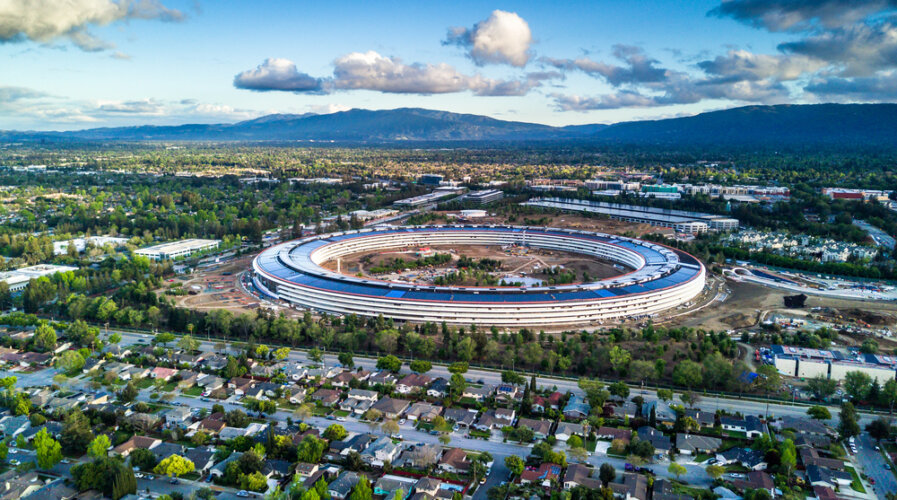The title of “world’s largest company” is a constantly moving target. Market capitalization, the metric used to determine this ranking, fluctuates based on factors like stock price, outstanding shares, and investor sentiment. However, companies vying for this prestigious title tend to be industry leaders, driving innovation and shaping the global economy.
While the top spot may change hands frequently, a pattern emerges: tech giants dominate the rankings. This article explores the current landscape of the world’s largest companies, delving into the strategies and sectors that propel them to the top.
Tech Titans Reign Supreme
The tech industry boasts the most prominent companies on the world stage. Apple, currently holding the top position, exemplifies this dominance. Despite facing occasional dips due to sales fluctuations, the company’s strategic shift towards recurring revenue streams through subscriptions and services has cemented its market leadership.
Microsoft, a long-time contender, dethroned Apple several times, showcasing the competitive nature of the tech sector. Their focus on software licenses, cloud computing subscriptions, and video game services provides a steady flow of income, contributing to their impressive market cap.
Amazon, another tech behemoth, has also held the top spot. Their e-commerce dominance, coupled with ventures into cloud computing (Amazon Web Services) and media streaming (Prime Video), positions them as a diversified powerhouse. Google (parent company: Alphabet) and Tesla, with their ventures into AI, self-driving technology, and data-driven services, further solidify the tech sector’s hold on the top rankings.
This trend highlights a crucial shift in the global economy. Investors increasingly favor companies that can turn devices into consistent and predictable revenue streams, a strategy tech giants have mastered.
Beyond Tech: Enduring Giants in Other Sectors
While tech reigns supreme, other sectors boast prominent players in the world’s largest companies arena. Here are some notable examples:
- Healthcare: Berkshire Hathaway, a holding company led by legendary investor Warren Buffett, sits comfortably in the top five. Healthcare giants like UnitedHealth and Eli Lilly also make their mark, reflecting the growing importance of healthcare services in today’s world. Novo Nordisk, a Danish pharmaceutical company, further strengthens the healthcare sector’s presence.
- Finance: Visa, a leader in digital payment solutions, represents the financial sector’s influence.
- Traditional Industries: Interestingly, ExxonMobil, an oil and gas giant, clings to a spot in the top 20, showcasing the enduring presence of traditional industries despite the tech boom.
- Luxury Goods: LVMH, a French luxury goods conglomerate encompassing renowned brands like Louis Vuitton and Christian Dior, demonstrates that established players in niche markets can still compete with tech giants.
Global Representation: A Broader Picture

The United States undeniably holds a dominant position in the rankings, with many top 20 companies headquartered there. However, the global landscape is well-represented with companies from Saudi Arabia (Saudi Aramco), Taiwan (TSMC), and Denmark (Novo Nordisk) making significant marks. LVMH, the French luxury giant, further emphasizes this global presence.
The Ever-Changing Landscape: Market Fluctuations and Unforeseen Events
Market capitalization is a dynamic metric, susceptible to various factors. Unpredictable events like the COVID-19 pandemic significantly impacted company performance. E-commerce and digital platforms thrived during lockdowns, while tourism and live entertainment companies witnessed a downturn. These fluctuations highlight the importance of strong fundamentals beyond just share price.
Similarly, geopolitical events and policy changes by institutions like the Federal Reserve can cause market swings. Tesla’s drop from the top five in 2022 due to CEO Elon Musk’s acquisition of Twitter exemplifies this vulnerability.
Beyond Size: What Makes a Company Truly Admired?
While size is a noteworthy achievement, it’s not the sole factor that garners admiration. The companies listed here are not just large, but also admired for various reasons:
- Diverse Range of Offerings: Companies like Amazon and LVMH offer a wide variety of products and services, catering to a broader customer base.
- Technological Innovation: Tech giants like Apple and NVIDIA are constantly pushing boundaries in their respective fields.
- Historic Past and Wise Management: Companies like Berkshire Hathaway, led by Warren Buffett, boast a rich history and sound leadership.
- Customer and Investor Services: Companies that prioritize customer satisfaction and provide excellent investor relations are more likely to be admired.

